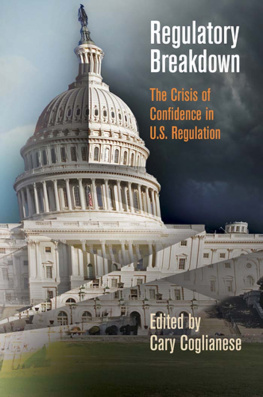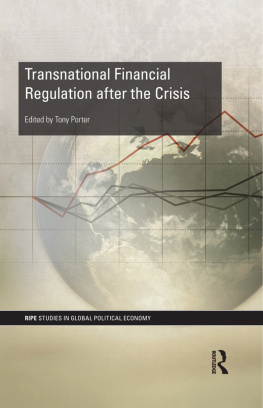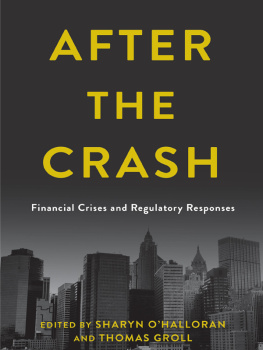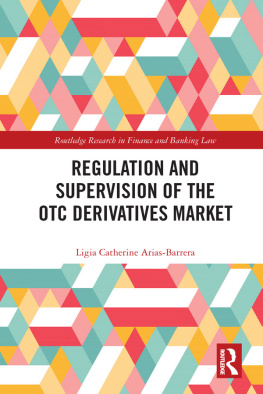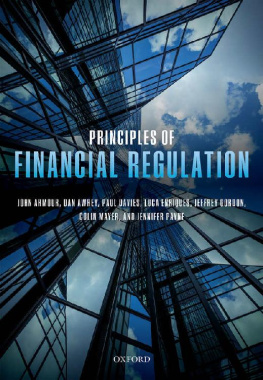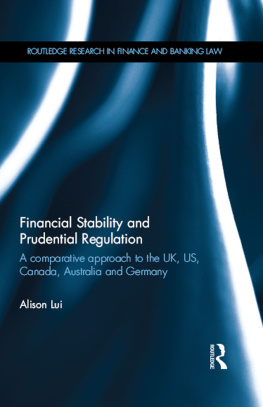Copyright 2012 University of Pennsylvania Press
All rights reserved. Except for brief quotations used for purposes of review or scholarly citation, none of this book may be reproduced in any form by any means without written permission from the publisher.
Published by
University of Pennsylvania Press
Philadelphia, Pennsylvania 19104-4112
Printed in the United States of America on acid-free paper
10 9 8 7 6 5 4 3 2 1
Library of Congress Cataloging-in-Publication Data
Regulatory breakdown : the crisis of confidence in U.S. regulation / edited by Cary Coglianese.
p. cm.
ISBN 978-0-8122-4460-1 (hardcover : alk. paper)
Includes bibliographical references and index.
1. Trade regulationUnited StatesEvaluation. 2. Trade regulation Political aspectsUnited States. 3. Consumer protectionPolitical aspects United States. 4. Consumer protectionLaw and legislationUnited States. 5. Independent regulatory commissionsUnited StatesEvaluation.
I. Coglianese, Cary.
KF1600 .R437 2012
343.7308
2012013168
Contents
Christopher Carrigan and Cary Coglianese
W. Kip Viscusi and Richard Zeckhauser
Lori S. Bennear
Adam J. Levitin and Susan M. Wachter
Roberta Romano
Matthew A. Baum
Jonathan Baron, William T. McEnroe, and Christopher Poliquin
Jason Webb Yackee and Susan Webb Yackee
Susan L. Moffitt
William W. Bratton and Michael L. Wachter
Eric Helland and Jonathan Klick
Theodore W. Ruger
Preface
Has the United States suffered a regulatory breakdown? The answer to this question would appear to be an obvious yes. Times have been especially tough over the past several years, and virtually every account of the nations woes places considerable blame on regulation. One might even say that criticism of regulation has become one of the rare commonalities between Democrats and Republicansalthough their respective critiques differ profoundly. For those on the left, the United States never would have suffered calamities such as the financial crisis or the Gulf Coast oil spill had regulatory standards been more stringent or had regulators kept from falling asleep at the switch. For those on the political right, the country never would have suffered such deep and sustained economic problems had burdensome regulationsin particular, uncertainty over new regulationsnot stifled the business risk-taking needed to jumpstart economic growth. Whichever account is correctand perhaps both have meritU.S. regulation clearly suffers a deep crisis of confidence. Government has become less trusted and politics more polarized, with debates over regulatory policy readily devolving into highly charged ideological disputes.
In such a heated political climate, academic research on regulation can make a valuable contribution. If policymakers hope to fix what ails the U.S. system of regulation, they need to do more than just act on hunches or respond to hasty conclusions. They need to understand problems as fully as possible and discover the causes that underlie those problems. Regulatory failures, after all, can arise for a variety of reasons, with triggering factors occurring at one or more stages of the regulatory process. Failures may occur because problematic activities or behaviors have remained unregulated when they should have been regulated. Or they may occur because relevant activity was regulated but with the wrong kind of rules. The process of creating the rules might well have broken down through ignorance, ideology, delay, or corruption. Another possibility is that the rules and the processes that generated them may have been appropriate but the monitoring and enforcement of those rules may have been insufficientor, alternatively, much too overbearing. What we need is further research and careful analysis to disentangle the possible causes of regulatory failure, help identify appropriate policy responses, and assess whether reforms actually work.
The chapters assembled in this book provide much-needed scholarly perspective on recent controversies over regulation in the United States. Written by some of the nations foremost experts in law, economics, political science, and public policy, the chapters dig beneath the surface-level diagnoses that have tended to dominate policy deliberations. In Chapter 1, Chris Carrigan and I explain how psychological and political factors have contributed to the current crisis of confidence over regulation, as politicians and the public naturally seek something to blame when calamities occur. We caution against leaping to the conclusion that regulation has failed whenever disaster occurs. Regulation manages risk; it cannot purport to eliminate it altogether, unless of course a risky business activity is banned outright. Accordingly, when a disaster occurs it may not necessarily reflect the failure of regulation as much as the tragic but rare and inevitable consequence of a regulatory policy that responds to and makes tradeoffs in societys competing values.
Effective risk regulation is not a one-size-fits-all proposition, as W. Kip Viscusi and Richard Zeckhauser remind us in Chapter 2. Disasters arise out of complex social interactions that have varying causes, victims, losses, and compensation challenges. Regulatory policies directed at different types of catastrophes must also necessarily be varied and at times complex. Invoking a range of examples in their chapter, Viscusi and Zeckhauser offer an accessible but rigorous framework for identifying successful regulatory responses to the problem of catastrophic risk. They urge the adoption of a portfolio approach that searches for an optimal deployment of market and tax incentives, ex post liability, and preventive regulation. For high-stakes risks such as those associated with nuclear power generation or deepwater oil drilling, they favor holding all firms engaged in risky operations strictly liable for damages after a catastrophe arises. They also believe firms should be required to demonstrate substantial financial resourcesassets plus insuranceto cover most levels of potential harms. Firms should also face an up-front tax, before any accident occurs, for the expected excess costs of extreme catastrophes, that is, harms that would exceed their ability to pay. Such a tax would provide firms an immediate and continuous incentive to operate safely.
Viscusi and Zeckhausers chapter provides a broad theoretical framework not only for identifying successful regulatory solutions but also for situating the next three chapters of the book, each of which zeroes in on a specific regulatory crisis: the Gulf Coast oil spill, the mortgage meltdown, and the financial crisis. In Chapter 3, Lori Bennear carefully analyzes the environmental and safety risks from offshore drilling in the wake of the Gulf Coast spill, showing how the current regulatory approach fails to address human factors that cut across the technological redundancies mandated by current rules. Bennear compares the regulatory status quo with two alternative strategies, one that requires firms to develop detailed management systems and the other that would require drilling firms to pay safety deposits that would provide meaningful, new incentives for firms to implement effective risk management.


